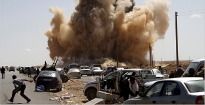Report: WH Giving Up on No Fly Zone
The barrage here [in Benghazi] offered a loud and ferocious counterpoint to stalled efforts by Western diplomats to agree on help for the retreating rebels, like a no-flight zone, even as Colonel Qaddafi warned the insurgents on Tuesday that they had only two choices: surrender or flee. With the advances made by loyalists, there is growing consensus in the Obama administration that imposing a no-flight zone over Libya would no longer make much of a difference, a senior official said. Just moving the ships and planes into place to impose an effective no-flight zone, the official said, would take until April, too late to help rebels hunkered down in Benghazi.
While administration officials said the United States would not obstruct efforts by other countries to build support for a no-flight zone in the United Nations, President Obama met with his National Security Council on Tuesday to consider a variety of other options to respond to the deteriorating situation.
Among those options are jamming Libyan government radio signals and financing the rebel forces with $32 billion in Libyan government and Qaddafi family funds frozen by the United States. That money could be used either for weapons or relief. The meeting broke without a decision, the official said.
“This is another indication of the constant exploration of different options that we have to increase the pressure on the Qaddafi regime as we go forward,” the White House press secretary, Jay Carney, said Tuesday.
But in fact, the administration’s options have narrowed with the dwindling viability of a no-flight zone. The White House is considering more aggressive airstrikes, which would make targets of Colonel Qaddafi’s tanks and heavy artillery — an option sometimes referred to as a “no-drive zone.” The United States or its allies could also send military personnel to advise and train the rebels, an official said.
But given the lack of consensus behind a no-flight zone, these options are viewed as even less likely. It is also not clear that airstrikes would be more effective than a no-flight zone.
“Most of these weapons are no longer stored in ammunition depots; most of them have been dispersed into towns and cities,” said James M. Lindsay, the director of studies at the Council on Foreign Relations. Singling out these weapons individually, he said, greatly increases the chances of civilian casualties.
Moreover, senior officials, notably the national security adviser, Thomas E. Donilon, have made it clear that the United States does not view Libya as a vital strategic interest.
Click here to read more.


